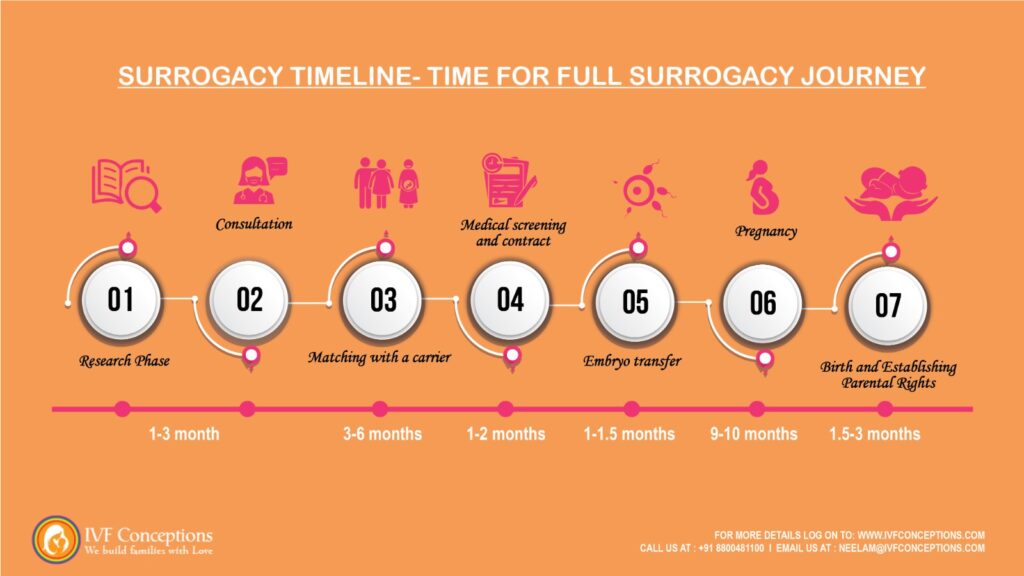What Is Surrogacy Meaning: A Comprehensive Guide

What Is Surrogacy Meaning and Understanding Surrogacy Meaning and Purpose
Surrogacy is a topic that has gained increasing attention in recent years yet remains surrounded by misconceptions and debates. What Is Surrogacy Meaning? Surrogacy is a process in which a woman, known as a surrogate or gestational carrier, carries and gives birth to a child on behalf of intended parents. After birth, the legal parenthood is transferred to the intended parents, allowing them to raise the child.
This definitive guide to gestational surrogacy explores how this family-building option works, the differences between traditional vs. gestational surrogacy, and the legal aspects of surrogacy in various countries. Understanding surrogacy is essential for those considering this path to parenthood, ensuring a well-informed and smooth journey toward welcoming a child into their lives.
- Book an online appointment: Get a free online consultation.
- Call\W:+91-8800481100 Email:[email protected]
Surrogacy is often seen as a solution for individuals or couples who are unable to conceive and carry a child on their own. While the concept of surrogacy may seem straightforward, there are many complex factors at play, including legal, ethical, and emotional aspects. As a result, the question of “what is surrogacy meaning” requires a deeper understanding and exploration.
More Resources to Read:
Surrogacy Guide for Surrogate Mothers
Surrogacy Guide for Intended Parents
How does the surrogacy process work
In this article, we will delve into the intricacies of surrogacy, examining its various forms, the process involved, and the implications for all parties involved. By shedding light on this increasingly prevalent practice, we hope to provide a comprehensive understanding of the meaning of surrogacy and its impact on individuals and society as a whole.
Key Takeaways:
- Diverse Paths to Parenthood: Surrogacy offers a diverse range of individuals and couples, including those facing infertility, same-sex couples, and those with medical concerns, an opportunity to experience the joys of parenthood.
- Legal Landscape: Navigating the legal landscape is crucial. Understanding surrogacy laws in the chosen region, comprehensive legal agreements, and ongoing legal support are integral components.
- Emotional Resilience: Surrogacy is a journey filled with emotions. Both surrogates and intended parents benefit from open communication, mental health support, and a strong sense of community.
- Cultural Sensitivity: Acknowledging and respecting cultural perspectives on surrogacy contribute to an inclusive and supportive environment.
- Medical Excellence: Prioritizing the health and well-being of surrogates and the developing child is non-negotiable. Rigorous health screenings, ongoing medical care, and emotional support form the pillars of a successful surrogacy journey.

Introduction: What Is Surrogacy Meaning for Intended Parents?
Surrogacy, a practice where a woman carries a pregnancy on behalf of another individual or couple, has gained significant traction in modern society. It has emerged as a solution for couples facing fertility issues, same-sex couples, and individuals who are unable to conceive or carry a pregnancy to term.
The increasing popularity of surrogacy can be attributed to advancements in reproductive medicine, which have expanded the options available for those seeking to build a family. This method allows individuals to experience the joy of parenthood and fulfill their desire for a biological connection with their child, despite physical limitations.
As surrogacy continues to gain recognition and acceptance, its significance as a viable and compassionate alternative in the realm of reproductive medicine cannot be overlooked.
What does Surrogacy mean in layman’s terms?
So, what is the meaning of surrogacy? Let’s explore this in detail. Surrogacy is a method of assisted reproduction that involves a woman carrying a pregnancy on behalf of another individual or couple. In simple terms, it is the process in which a woman agrees to carry and give birth to a child for someone else.
This arrangement is usually made when individuals or couples are unable to conceive or carry a pregnancy themselves due to various reasons, such as medical conditions or infertility issues.
Surrogacy allows these individuals or couples to have a child and experience the joys of parenthood, despite their own physical limitations. It is a compassionate and supportive solution that has provided hope and happiness to countless families around the world.
Surrogacy comes in different forms, each with distinct characteristics and implications for both the surrogate and the intended parents. Let’s explore the primary types:
Traditional Surrogacy
Traditional surrogacy involves the surrogate providing both the egg and carrying the pregnancy. This method, though less common nowadays, was prevalent in earlier surrogacy practices. It creates a genetic connection between the surrogate and the child.
Gestational Surrogacy
Gestational surrogacy, the more prevalent approach today, separates the genetic material from the surrogate. In this process, the embryo is created using the egg of the intended mother or a donor and then implanted in the surrogate’s uterus. This type eliminates the genetic link between the surrogate and the child.
Key Differences and Considerations
Understanding the differences between traditional and gestational surrogacy is crucial for individuals considering this path. While traditional surrogacy involves a genetic link, gestational surrogacy provides a way for individuals or couples to have a child without a direct genetic connection to the surrogate.
Fact: According to a study published in the Journal of Human Reproductive Sciences, gestational surrogacy is associated with fewer legal complications and a lower emotional burden on the surrogate compared to traditional surrogacy.
What is Surrogacy Definition?
Surrogacy is a complex reproductive arrangement that involves a woman, known as the surrogate, carrying a pregnancy and giving birth to a child for the intended parents. There are two main types of surrogacy: traditional surrogacy and gestational surrogacy.
In traditional surrogacy, the surrogate’s own egg is fertilized with the intended father’s sperm or donor sperm through artificial insemination. As a result, the surrogate is genetically related to the child she carries.
On the other hand, gestational surrogacy involves the implantation of an embryo created through in vitro fertilization (IVF) using the intended parents’ or donors’ gametes into the surrogate’s uterus. The surrogate in this case has no genetic connection to the child.
From a legal and ethical perspective, surrogacy arrangements vary depending on the country and jurisdiction. In some places, surrogacy is highly regulated, while in others it may be prohibited or unregulated. It is crucial for all parties involved to have clear legal agreements that outline rights, responsibilities, and financial arrangements to ensure a smooth and legally protected process.
Aside from the legal and ethical considerations, surrogacy also poses emotional and psychological challenges for all parties involved. Intended parents may experience a range of emotions, including excitement, anxiety, and concern, as they entrust another person to carry their child. Surrogates may also experience a mix of emotions, including attachment and the joy of giving the gift of parenthood, but may also face emotional challenges upon relinquishing the child after birth.

Gestational Surrogacy Meaning
Gestational surrogacy is a form of surrogacy where the intended parents’ or donors’ genetic material is used to create an embryo through in vitro fertilization (IVF). In this process, the eggs from the intended mother or a donor are fertilized with sperm from the intended father or a donor in a laboratory. The resulting embryo is then transferred to the uterus of a gestational surrogate, who carries the pregnancy to term.
Unlike traditional surrogacy, the gestational surrogate has no genetic relation to the child she carries. This method allows individuals or couples who are unable to conceive or carry a pregnancy themselves to have a biological child.
Gestational surrogacy offers a way for intended parents to experience the journey of parenthood, while the gestational surrogate plays a vital role in helping them achieve their dream of having a family.
Reasons for Choosing Surrogacy
The decision to pursue surrogacy is deeply personal and often driven by a variety of reasons. Understanding these motivations provides insight into the diverse circumstances that lead individuals and couples to choose surrogacy as their path to parenthood.
- Infertility Challenges in Intended Parents
One of the primary reasons individuals opt for surrogacy is infertility. Couples facing challenges in conceiving or carrying a pregnancy to term may turn to surrogacy as a viable solution. Surrogacy offers the opportunity for intended parents to have a biological connection to their child while overcoming fertility obstacles.
- Same-Sex Couples and Surrogacy
Surrogacy plays a pivotal role in family-building for same-sex couples. Whether male couples looking to have a child biologically related to one partner or female couples desiring a shared biological connection, surrogacy offers inclusivity and equal opportunities for parenthood.
List: Advantages of Surrogacy for Same-Sex Couples
- Allows biological connection for one or both partners.
- Provides a unique family-building option.
- Overcomes biological constraints in same-sex relationships.
- Medical Reasons for Surrogacy
Individuals with medical conditions that make pregnancy risky or impossible may choose surrogacy. This includes women with uterine issues, recurrent pregnancy loss, or other health concerns. Surrogacy offers a safer alternative to traditional pregnancy, ensuring the health and well-being of both the intended parents and the child.
Medical Conditions Leading to Surrogacy
| Medical Condition | Surrogacy Consideration |
| Uterine Issues | Risk of complications during pregnancy |
| Recurrent Pregnancy Loss | Ensuring a healthy environment for the baby |
| Medical Contraindications | Pregnancy poses a threat to the woman’s health |
Common Challenges Faced During Surrogacy Journeys
- Legal Complexities: Varying surrogacy laws across regions can pose legal challenges for both surrogates and intended parents.
- Emotional Rollercoaster: The emotional journey of surrogacy involves highs of joy and connection but may also bring moments of anxiety and uncertainty.
- Financial Considerations: The costs associated with surrogacy, including medical procedures, legal fees, and compensation for surrogates, can be a significant factor.
List: Key Factors Contributing to Successful Surrogacy Journeys
- Clear communication and understanding between surrogates and intended parents.
- Robust legal support to navigate potential challenges.
- Emotional support for all parties involved throughout the process.
In the upcoming section, we will explore the cultural sensitivity surrounding surrogacy, acknowledging the diverse perspectives and stigmas that may exist in different societies.

The Surrogacy Process Explained– Step by Step
Embarking on a surrogacy journey involves a series of well-defined steps, from the initial consultation to the joyous moment of birth. Understanding each phase of the process is essential for both surrogates and intended parents.
Step1- Initial Consultation and Matching
The surrogacy journey often begins with an initial consultation involving both the intended parents and potential surrogates. During this meeting, expectations, preferences, and legal considerations are discussed. Matching, a crucial step, involves pairing intended parents with a suitable surrogate based on various factors, including compatibility and shared expectations.
Step 2 – Medical Procedures and In Vitro Fertilization (IVF)
Once matched, the medical journey begins. The intended mother or an egg donor undergoes ovarian stimulation to produce multiple eggs. These eggs are then fertilized with sperm to create embryos. In the case of gestational surrogacy, one or more embryos are transferred to the surrogate’s uterus.
List: Key Steps in the Medical Process
- Ovarian Stimulation
- Egg Retrieval
- Fertilization
- Embryo Transfer
Step 3- Pregnancy and Birth
Following successful embryo implantation, the surrogate progresses through the pregnancy with regular medical check-ups. The surrogate and intended parents often form a close relationship, sharing the joyous moments of pregnancy, including ultrasounds and other milestones. The surrogacy journey culminates in the birth of the child, a momentous occasion celebrated by all involved.
Emotional and Ethical Considerations
Surrogacy is a deeply emotional and ethically nuanced journey, involving a myriad of feelings, relationships, and moral considerations. Both surrogates and intended parents navigate a complex terrain of emotions and ethical questions throughout the surrogacy process.
Emotional Impact on Surrogates and Intended Parents
For surrogates, the decision to carry a child for someone else is a profound and altruistic choice. The emotional bond formed with the intended parents can be powerful and unique. Intended parents, on the other hand, experience a mix of excitement, gratitude, and sometimes anxiety throughout the journey.
List: Emotional Dynamics in Surrogacy
- Surrogates: Empowerment, altruism, attachment to the child.
- Intended Parents: Anticipation, gratitude, anxiety, and the joy of impending parenthood.
Ethical Debates Surrounding Surrogacy
Surrogacy has sparked ethical discussions related to autonomy, exploitation, and the commodification of reproductive services. Critics argue that surrogacy can potentially exploit vulnerable women, while proponents emphasize the importance of autonomy and the right to choose.
Table: Ethical Considerations in Surrogacy
| Ethical Concern | Counterargument |
| Exploitation of Surrogates | Surrogacy agreements, legal protection, fair compensation |
| Commodification of Reproduction | Autonomy, informed decision-making, agency |
| Psychological Impact | Support systems, mental health care, open communication |
Historical Context of Surrogacy
To truly understand the meaning of surrogacy, we must journey through its historical evolution. The practice of surrogacy has roots that stretch back through time, shaped by societal norms, medical advancements, and changing perspectives.
Evolution of Surrogacy Practices
Surrogacy isn’t a modern invention; its historical roots trace back to ancient times. In some cultures, the concept of using a surrogate to carry a child for another family can be found in historical records. However, the methods and reasons for surrogacy varied significantly.
In the 20th century, medical advancements, particularly in assisted reproductive technologies (ART), played a pivotal role in shaping surrogacy as we know it today. The ability to separate genetic material from the woman carrying the child opened new possibilities and ethical discussions.
Cultural Perspectives on Surrogacy
Cultural attitudes toward surrogacy have undergone notable shifts. In some societies, surrogacy was embraced as a means to support childless couples, while in others, it faced ethical and moral scrutiny. Today, the acceptance of surrogacy varies globally, influenced by cultural, religious, and legal considerations.
Historical Milestones in Surrogacy
| Year | Milestone |
| Ancient | References to surrogacy in historical texts |
| 1980s | Introduction of gestational surrogacy |
| 1990s | Legal and ethical debates on surrogacy emerge |
| 21st Century | Global variations in surrogacy laws |

Surrogacy and Society
The societal perspectives on surrogacy play a crucial role in shaping public opinion, influencing legislation, and impacting the experiences of those involved in the surrogacy journey. Let’s explore how surrogacy is perceived in various societies and how media representations contribute to these perspectives.
Changing Perceptions Over Time
Societal attitudes toward surrogacy have evolved significantly over the years. What was once viewed with skepticism or moral apprehension is now increasingly accepted as a valid and inclusive pathway to parenthood. This shift is attributed to increased awareness, changing family structures, and a more nuanced understanding of reproductive options.
Fact: In the 1980s, surrogacy was a topic of intense ethical debate, often portrayed negatively in the media. Today, the narrative has shifted, with more positive portrayals reflecting diverse family-building experiences.
The Role of Media in Shaping Public Opinion
Media plays a powerful role in shaping public perceptions of surrogacy. Positive representations in movies, documentaries, and news stories contribute to destigmatizing surrogacy, presenting it as a viable and compassionate choice for family-building.
Legal Aspects of Surrogacy
Understanding the legal dimensions of surrogacy is paramount for those embarking on this journey. Surrogacy laws vary significantly across countries and regions, impacting the rights and responsibilities of surrogates, intended parents, and the child.
Global Variations in Surrogacy Laws
Surrogacy is a legal landscape with diverse terrain. Countries and regions have distinct approaches, ranging from fully embracing and regulating surrogacy to imposing strict prohibitions. It’s crucial for individuals considering surrogacy to be aware of the legal framework in their jurisdiction.
Table with information on countries and their surrogacy laws:
| Country | Commercial Surrogacy | Altruistic Surrogacy | Surrogacy Status |
| Australia | Prohibited | Allowed | Altruistic surrogacy is legal in all jurisdictions. Commercial surrogacy is a criminal offense. |
| Canada | Banned | Allowed | Only altruistic surrogacy is permitted. Compensation for gestational carriers is limited to approved expenses. |
| Colombia | Uncertain | Allowed | There are no clear rules, but altruistic surrogacy is performed and well tolerated. |
| Greece | Banned | Allowed | Heterosexual couples, single females allowed. |
| India | Prohibited | Allowed | Altruistic surrogacy is permitted for certain couples based on medical and age criteria. |
| Israel | Allowed | Allowed | Gestational surrogacy is legal under the Embryo Carrying Agreements Law. |
| Kenya | N/A | N/A | No legal regulations/laws for surrogacy in Kenya. |
| Mexico | Allowed | N/A | Surrogacy, along with ovum and sperm donation, has been legal since 1992. |
| New Zealand | N/A | Allowed | Altruistic surrogacy is legal. |
| Thailand | Banned | N/A | Commercial surrogacy is criminalized under the Medical Council Act. |
| Ukraine | Allowed | Allowed | Surrogacy and egg/sperm donation are legal and supported by liberal laws. |
| United Kingdom | N/A | Allowed | Surrogacy laws vary across different states/territories in the UK. |
| United States | Varies by state | Allowed | Surrogacy laws vary by state, some are surrogacy-friendly, while others restrict or penalize commercial surrogacy. |
Additional guide for intended parents:
Best surrogacy agency in India
Best surrogacy agency in Mexico
Best surrogacy agency in Colombia
Best surrogacy agency in Argentina
Best surrogacy agency in Georgia
Best surrogacy agency in the USA
Best surrogacy agency in Ukraine
Best surrogacy agency in Armenia
Conclusion
In conclusion, surrogacy is a significant option for individuals and couples facing infertility or reproductive challenges. It provides hope and the opportunity to have a biological child through gestational surrogacy, where the genetic material of the intended parents or donors is used to create an embryo.
This process allows intended parents to experience the joys of parenthood while the gestational surrogate plays a crucial role in helping them build their families. The positive impact of surrogacy cannot be overstated, as it offers a solution and a pathway to fulfillment for those who have struggled with infertility. For those considering surrogacy, it is important to further explore the topic and seek professional guidance to ensure a successful and informed journey towards building their family.
If you’d like to learn more about IVF, Egg Donation, or surrogacy services globally, check out the rest of our website at Complete Surrogacy Agency. We offer legally secure and affordable surrogacy consulting services for FREE.
For more resources on IVF and Surrogacy, browse our other web page- IVF Conceptions.
For more resources on IVF and Surrogacy, browse our other web page- Georgia Surrogacy Agency.
Complete Surrogacy: Your Trusted Partner in International Surrogacy
At Complete Surrogacy, we have over 15 years of experience in international surrogacy, guiding 4,000+ intended parents worldwide. We provide safe, ethical, and affordable surrogacy solutions for single parents, LGBTQ+ couples, and heterosexual couples.
As members of EFS and ESHRE, we adhere to the highest ethical and professional standards. Our expert team is committed to providing accurate, compassionate, and transparent guidance, ensuring a legally secure and smooth journey to parenthood.
Let us help you build your family with trust, care, and integrity.
Get in touch for one FREE Surrogacy Consultancy!
Our team includes experts from diverse backgrounds with leading reproductive attorneys, professionally trained top fertility doctors, former surrogacy case managers, experienced and kind surrogate mother and egg donor coordinators, mental health professionals specializing in infertility counseling, and a logistic support team to assist you in your chosen surrogacy country.
References used:
Frequently Asked Questions About Surrogacy
Q: What is the definition of surrogacy and how does it differ from adoption?
Surrogacy is a process where a woman carries and gives birth to a child on behalf of another person or couple. It is typically used when individuals or couples are unable to conceive or carry a pregnancy themselves.
Surrogacy differs from adoption in that it involves the use of a surrogate mother to carry and give birth to the child, whereas adoption involves legally and permanently assuming the parenting rights and responsibilities of a child who is not biologically related to the adoptive parents.
Surrogacy allows for a genetic connection between one or both of the intended parents and the child, while adoption does not.
Q: What are the different types of surrogacy arrangements and how do they work?
There are two main types of surrogacy arrangements: traditional surrogacy and gestational surrogacy.
In traditional surrogacy, the surrogate is genetically related to the child as her own egg is used, either through artificial insemination or natural conception. In gestational surrogacy, the surrogate carries a pregnancy created with the intended parents’ embryo through in vitro fertilization (IVF).
This means the surrogate has no genetic connection to the child. Both types involve legal agreements, medical procedures, and often extensive screening and counseling. Surrogacy allows individuals or couples who cannot carry a pregnancy themselves to have a child, with the help of a surrogate who carries the pregnancy on their behalf.
Q: Is surrogacy legal everywhere?
No, surrogacy laws vary globally. Some countries fully support and regulate surrogacy, while others have strict prohibitions or limited regulations. It’s crucial to be aware of the legal landscape in the specific region where the surrogacy journey takes place.
Q: How are surrogates matched with intended parents?
Surrogacy agencies often facilitate the matching process, considering compatibility, preferences, and legal aspects. Clear communication and shared expectations play a crucial role in successful matches.
Q: What are the emotional challenges in surrogacy?
Both surrogates and intended parents may experience a range of emotions, from joy and anticipation to moments of anxiety. Open communication, support systems, and a strong legal framework can help navigate these challenges.
Q: How much does surrogacy cost?
Surrogacy costs vary widely and can include medical procedures, legal fees, compensation for surrogates, and other associated expenses. It’s essential to have a transparent understanding of the financial aspects before embarking on the surrogacy journey.
Q: Can same-sex couples opt for surrogacy?
Absolutely. Surrogacy provides a viable family-building option for same-sex couples, allowing for biological connection and shared parenthood.

Author Bio: Neelam Chhagani is an International Surrogacy Expert with 15 years of experience in the fertility and surrogacy domain. As the founder of IVF Conceptions and Complete Surrogacy, she has guided over 4,000 intended parents worldwide on their surrogacy journey to parenthood. Recognized as a trusted authority, she specializes in holistic infertility solutions and third-party reproduction consulting.
Holding an MA in Counselling Psychology and a PGD in Mental Health, Neelam is a proud member of the European Fertility Society (EFS) and the European Society of Human Reproduction and Embryology (ESHRE). She is also a leading surrogacy blogger, providing valuable insights into ethical and practical surrogacy solutions.
Since 2010, committed to supporting ALL family types, Neelam has been passionate about helping intended parents grow their families with compassion, integrity, and a focus on secure and affordable surrogacy options Globally.
Learn more about Neelam:
https://www.ivfconceptions.com/neelam-chhagani-surrogacy-consultant/
https://www.linkedin.com/in/neelam-chhagani-92892229/
https://www.quora.com/profile/Neelam-Chhagani















I was introduced to Neelam by a friend who worked with Neelam for surrogacy. Neelam is absolutely wonderful. I am a single male and the journey to fatherhood is not that easy. Neelam connected me to a program ideal for my circumstances. She was with me throughout the pregnancy providing advice and guidance along the way. I am so grateful I found her and am thrilled today that I have a beautiful daughter. I highly recommend Neelam to anyone who is on a journey to become a parent. Having a child has changed my world for the better. I wish others success with their own journey and recommend you connect with Neelam to find a path that is best for you.
SA (USA)